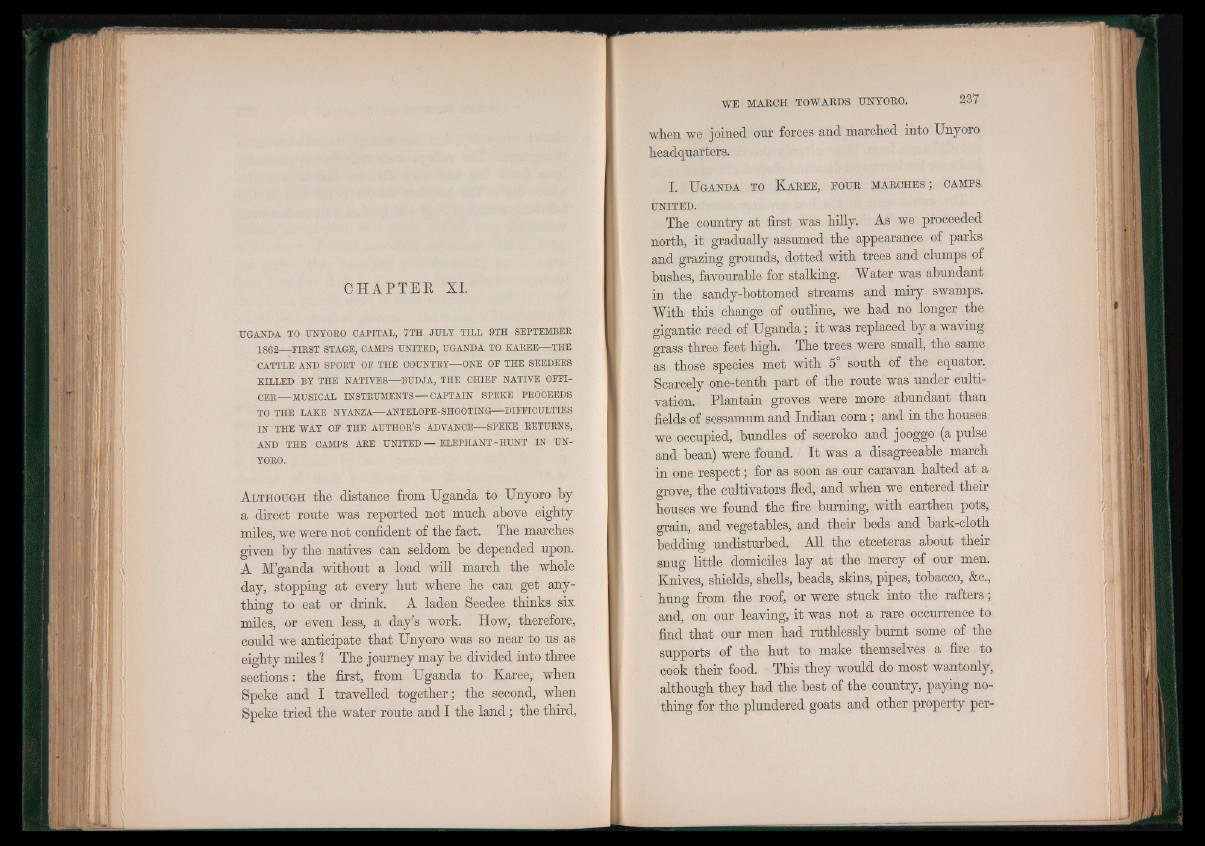
C H A P T E R XI.
UGANDA TO UNYORO CAPITAL, 7TH JULY TILL 9TH SEPTEMBER
1862— EIRST STAGE, CAMPS UNITED, UGANDA TO KAREE— THE
CATTLE AND SPORT OE THE COUNTRY— ONE OE THE SEEDEES
Tnr.T.ET) BY THE NATIVES— BUDJA, THE CHIEE NATIVE OEEI-
CER— MUSICAL INSTRUMENTS— CAPTAIN SPEKE PROCEEDS
TO THE latte NYANZA— ANTELOPE-SHOOTING— DIFFICULTIES
IN THE WAY OE THE AUTHOR’S ADVANCE— SPEKE RETURNS,
AND THE CAMPS ARE UNITED — ELEPHANT-HUNT IN UN-
YORO.
Although the distance from Uganda to Unyoro by
a direct route was reported not much above eighty
miles, we were not confident of the fact. The marches
given by the natives can seldom be depended upon.
A M’ganda without a load will march the whole
day, stopping at every hut where he can get anything
to eat or drink. A laden Seedee thinks six
miles, or even less, a day’s work. How, therefore,
could we anticipate that Unyoro was so near to us as
eighty miles ? The journey may be divided into three
sections: the first, from Uganda to Karee, when
Speke and I travelled together; the second, when
Speke tried the water route and I the land; the third,
when we joined our forces and marched into Unyoro
headquarters.
I. U ganda to K aree, eour marches ; camps
UNITED.
The country at first was hilly. As we proceeded
north, it gradually assumed the appearance of parks
and grazing grounds, dotted with trees and clumps of
bushes, favourable for stalking. Water was abundant
in the sandy-bottomed streams and miry swamps.
With this change of outline, we had no longer the
gigantic reed of Uganda; it was replaced by a waving
grass three feet high. The trees were small, the same
as those species met with 5° south of the equator.
Scarcely one-tenth part of the route was under cultivation.
Plantain groves were more abundant than
fields of sessamum and Indian corn; and in the houses
we occupied, bundles of seeroko and jooggo (a pulse
and bean) were found. It was a disagreeable march
in one respect; for as soon as our caravan halted at a
grove, the cultivators fled, and when we entered their
houses we found the fire burning, with earthen pots,
grain, and vegetables, and their beds and bark-cloth
bedding undisturbed. All the etceteras about their
snug little domiciles lay at the mercy of our men.
Knives, shields, shells, beads, skins, pipes, tobacco, &c.,
hung from the roof, or were stuck into the rafters;
and, on our leaving, it was not a rare occurrence to
find that our men had ruthlessly burnt some of the
supports of the hut to make themselves a fire to
cook their food. This they would do most wantonly,
although they had the best of the country, paying nothing
for the plundered goats and other property per